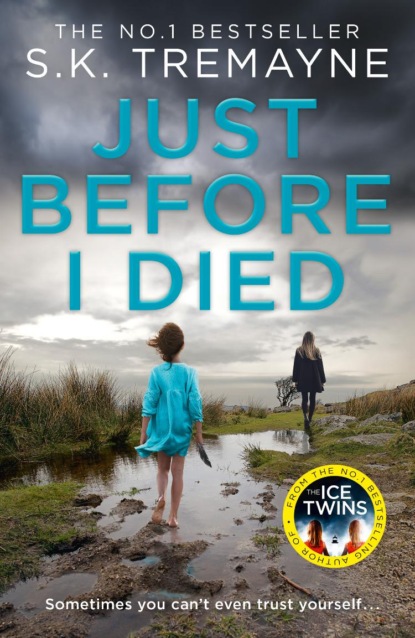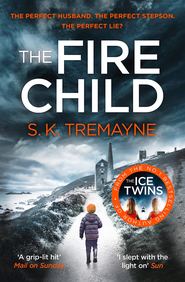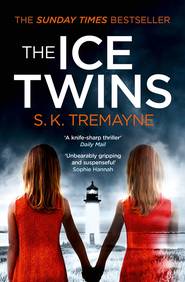По всем вопросам обращайтесь на: info@litportal.ru
(©) 2003-2024.
✖
Just Before I Died: The gripping new psychological thriller from the bestselling author of The Ice Twins
Автор
Год написания книги
2018
Настройки чтения
Размер шрифта
Высота строк
Поля
I’m her mother, but I have no idea what she is trying to do – be a kestrel?
Becky is now openly laughing, she can’t help it; then she turns a sudden shoulder and casually blanks my daughter and shouts to some other girls who wave back. Together, these girls head laughingly for the school door. The day has begun. The whole class has sprinted inside.
Except for Lyla, who is the only one left behind in the schoolyard.
Alone and silent, she watches all the other kids disappear into the school. Only the slump in her shoulders betrays her emotions. The loneliness.
I desperately want to run out of the car and give her the biggest ever hug, to make it all better, but I can’t, there’s no use: she would push me away. Instead she walks slowly towards the school; and now she too is gone, in through the doors.
‘Jesus,’ says Adam. ‘Jesus Christ.’
I know exactly what he means. Sadness is deep in me, and for this I have no coping mechanism. I can recover from a car crash, my brain can heal, but there is no convalescing for Lyla.
We are silent. Adam starts the car, turns it and retraces 300 yards, towards the National Park office. He turns off the engine, as if he is prepared to talk. But before he can speak, I say, ‘We have to do something. This can’t go on. It’s worse than last year.’
Adam stares ahead. ‘But she laughs at home. She loves the moors. And she loves the dogs. So she’s isolated at school, so what? She’s a loner. It happens.’
I can see the pain on his face; I know Adam lives for Lyla. Would kill to protect her. He wants only what’s right for her. And I usually listen to him, I want to believe. But I think about Lyla and her wariness in the car, and that lonely walk into school, that humiliation in the yard. I imagine her now, sitting on her own in the classroom, not talking to anyone. I picture her during breaks: sitting by the wall in the playground; a strange, eccentric girl with a weird smile, who mutters to herself about ants and newts while her classmates all talk to each other about selfies and music.
I can’t pretend any more.
‘No, Adam. We can’t go on thinking this is acceptable, that she’s just quirky, it’s not right.’
The muscles in his jaw are flexing: he’s grinding his teeth. ‘So what are you saying?’
‘We have to be proactive, do something. Take action. Because I don’t think she’s happy, not really. The other day I found her arranging dead birds in a pattern. She’s never done that before. All those dead little birds. Why?’
Adam stares ahead. He is in his Ranger uniform: green fleece, green trousers, hiking boots. On most men it might be unflattering but Adam makes it look good. Masculine. I think of the sex we haven’t had in a while. I want it again, I want him to turn and kiss me, sometimes he still does that, he’ll suddenly kiss me, passionately – across a car, while we’re walking the moors – and I love it. But his fierce blue eyes are fixed on the far horizon, as if he is looking beyond horrible Princetown.
I can sense the violent yearning in him. He doesn’t want me: he wants to be out there, alone on the uplands. Striding the heights of the northern moors: standing on Great Kneeset, gazing at High Willhays, Black Tor, Hangingstone Hill, Cut Hill, Fur Tor, Great Mis Tor, the places he loves, the places he has known since he was a boy. A child of the moors, like his daughter. Unlike me.
‘Look at those bloody houses,’ he says.
‘Sorry?’
He tilts his head at a row of grey drab council housing: accommodation for the wardens in the prison.
‘My dad built some of those, when he was a brickie. Imagine that. Imagine if that was your life’s work? Building the ugliest fucking houses in Britain. No wonder he turned to vodka.’
His laughter is sour. Adam doesn’t get on with his father, who fought and drank and womanized, scattering children from Exeter to Okehampton. Adam loves his uncle much better, Eddie Redway, a tenant farmer near Chagford. That’s where Adam did his real growing up, on Uncle Eddie’s smallholding, escaping the boozy arguments at home. That quaint little farm was where Adam came to know and love the moor, with his tearaway cousins, scrumping apples at Luscombe, fishing for little trout in the Teign.
The Redways have been a moorland family for countless generations. They’ve been tenant farmers and quarry workers and turf cutters since there was a church at Sheepstor; they have shaggy cattle in the blood, and buzzards on the brain.
And I am glad my daughter inherits this ancestry. She can claim Dartmoor as I can’t. But today this ancestry is irrelevant: right now, my daughter needs some modern therapeutic help, and Adam and I need to talk about that help.
‘Adam, please. I really think it’s time now, time we went to a doctor. Get her properly statemented? If it really is Asperger’s—’
‘I’m not putting a bloody label on her. Told you.’
‘But I’ve been researching, talking to people, going online. They say that if you get diagnosed earlier it’s better, the earlier the intervention the better the outcome, because you can get real help, therapy for social skills.’
He shakes his head. ‘I’m not hanging a sign around her neck. Look. Here’s Lyla Redway. She’s hopeless. Take pity. Hell with that.’
I raise my voice. ‘Asperger’s kids aren’t hopeless! You can’t say that. It’s a spectrum, we’re all on it somewhere, she’s just further down that spectrum, where you might need some help, and she’s definitely getting stranger – the birds, it was too eerie. Adam! Listen to me, please. She’s getting worse.’
Adam straightens his arms and lays his big hands hard on the steering wheel, as if he wants to race away. ‘And why do you think that is, Kath? Eh?’
‘Sorry?’
His face is turned towards me now: the blue eyes burning. ‘Why the hell do you think she might be getting worse?’
I flounder. Thrown by this outright hostility. ‘Sorry? What? Are you actually blaming me? Somehow it’s my fault? It’s my fault she’s getting worse?’ I have my own anger, now. ‘For God’s sake, it was an accident! It’s not anyone’s fault. I skidded on some ice.’ I search his face for sympathy. ‘I don’t understand, Adam – you and Lyla – you should be happy I’m alive: I nearly died. I’m alive! And anyway: this is about our daughter, not me. We have to think about her.’
‘That’s all I do think about,’ he says, in a low, dark voice. ‘And now I have to go to work. Earn some money. For Lyla.’ Without another word, he leans across and opens my door, inviting me to step outside.
His stubbled jaw is set, his frown is sombre. He won’t be swayed. He is looking at me the way Lyla looked at him. Wary. Distant. Guarded.It feels like our once-contented family is falling into mutual suspicion. And I have no idea why.
‘OK, Adam, OK, but I won’t let it go. Not this time.’
Climbing out of the car, my bag over my shoulder, I watch him drive away, gears grinding. As I turn towards the Park offices I can sense the great prison, looming behind me.
You can always sense the prison, in Princetown.
Monday afternoon
Two p.m.? I stare at the clock on the wall of the cream-painted National Park offices with a sense of unhappy surprise.
Where did the day go?
I’m used to losing track of working hours if the work is compelling. If I am, say, writing new brochures about the history or archaeology of the park, describing the wistful stone circle of Buttern Hill, the cottage at Birchy Lake where the old witches lived with a dozen black cats, the famous grave of Kitty Jay who killed herself for love, after falling pregnant by some wicked toff – that grave on which people still poignantly lay flowers – when I am immersed in writing these wonderful stories, I can happily misplace an entire afternoon.
The same goes for a busy summer day at one of the visitor centres, in Haytor, or Postbridge, when we can’t move for hearty German caravanners and determined French hikers – all looking for maps, loos, Wi-Fi signals – then the hours can fly past.
But it’s the depths of winter. No one comes to the moor in January. Half the National Park staff take long holidays around this time, as there is little to achieve – except what I’m doing now. Tweaking, twiddling. Revising the Park’s official leaflets and websites. Updating the policy on dogs in National Park tea-rooms. It’s deathly boring. The sort of stuff that would normally make the minutes drag by.
And yet I’ve got myself lost in the assignment.
‘What’s up, Kath? Having too much fun?’
It’s my boss, Andy, he must have heard me sigh. He’s a nice guy, blond, younger than me, newish. Been here two years. I sometimes wonder if I should resent him, that I didn’t get the promotion. But I don’t. I like my more varied employment. Usually.
‘Sorry, Andy. Was I sighing a bit loudly?’
‘You could say that.’
‘Well, I’m updating the rules on campervans in car parks, out of season. Perhaps I’m overexcited?’
I hear him chuckle. He’s the only other person in the large, open-plan office today. He is framed by the windows, where the Princetown sky is now as dark and sombre as Dartmoor granite. The winter sun can be so painfully brief.







